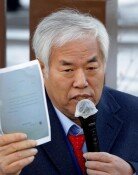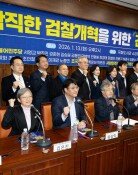[Column] Korea hovers on brink of 2nd crisis
[Column] Korea hovers on brink of 2nd crisis
Posted November. 22, 2000 14:26,
Nov. 21 marked the three-year anniversary of the Korean government making a request for an emergency loan from the International Monetary Fund. Three years have passed, and Korea has graduated from the "IMF crisis," yet the economy today seems not much better off than three years ago.
Just as the overdue handling of the Hanbo Steel and the Kia Motors bankruptcies was the tripping stones to the economy in 1997, the current dragged out handling of the Hyundai Engineering & Construction and Daewoo Motor has presented one today. The instability in the financial and stock markets due to the political and the economic uncertainties are much the same now as three years ago.
The political wrangling and the lack of leadership by the political leaders are plain to see today as three years ago. Recently, the government`s statement of will concerning the business and financial restructuring seemed promising, but the government`s unprincipled and near-sighted response to the Hyundai and Daewoo crisis has quashed all hope of business and financial restructuring reform. As confusion is beginning to set in not only economically, but also politically and socially, many cannot but fear another economic crisis.
The crisis three years ago was due to the collapse of trust, and the current loss of trust seems much worse than then. The discontent of the stock investors concerning whether the financial statements of the listed companies could be trusted seems not to have lessened. The companies, rather than striving for profit dividends for the investors, they continue their old family management style veiled in mystery. The banks and other financial institutions are still under the shadow of the political influence and have lost their ability to make decisions on their own even as their very existence is threatened by non-performing loans to the non-viable companies.
How could the stock market investors who have lost bulk of their savings due to the flip-flopping government policies possibly trust the government? Trust starts with honesty and blossoms with transparency. Only a society that upholds trust and responsibility can bear fruit.
In 1997, the delayed response to the coming crisis resulted in greater damage. Today, three years later, the government seems once again to be lacking in the ability to respond quickly. Being mired in political rhetoric, the government only offers haphazard patch-up response rather than addressing the real issue even as the instability is shaking the very foundation of society.
The after-the-fact response in dealing with the continuing problem of the Daewoo and Hyundai has worsened the moral hazard of the two companies while previously viable secondary parts supplier companies have begun a slide downward due to liquidity freeze and the loss of credit. The situation has created more loan defaults, which in a vicious cycle leads to a wider liquidity crunch and loss of credit.
As long as the government fails to establish a principled restructuring measure but continues to wield influence in the direction of individual companies the corrupt practice of politically influencing the economy cannot be abolished. It is time to wield the surgical knife and sever the links leading to the vicious cycle. Immediate closures of all nonviable companies must take place upon discovery.
Having learned a lesson through the national crisis caused by the lack of leadership by the government and the politicians three years ago has not changed the situation much today. The politicians still are mired in party warfare even as the government falters and fails to handle its responsibilities.
It is the responsibility of the government to wisely overcome and resolve the resistance of the various factions such as the labor unions against the reform efforts. However, the government`s flip-flop on issues and its unprincipled policies have resulted in loss of public trust.
As such, many of the factions have called for direct talks with the president, and many of the contentions indeed might require the direct involvement of the president for resolution.
However, the government is a system whose actions are also governed by laws and principles. For the system to be wholly functional, all components of the government system must adhere to the principle and the leadership of the government and society must take the lead in setting an example of honesty and adherence to principle.
Many of the neglected common folks are suffering. To avoid another greater suffering, the second economic crisis must be avoided. Today, there are many heads of households on the street with bottles of soju in their hands rather than work. There are children who sleep with empty stomachs this winter. There is a great number of college graduates who make up a large cross-section of unemployed today.
In order to avoid a second economic crisis, the political and the governmental reforms, not to mention the financial and business reforms, must take place. There is not much time to lose. The government and the ruling party must regain trust and divert all their efforts to stabilize the nation.
Prof. Choi Do-Soung, College of Business Adminstration, Seoul National University



![[속보]윤석열 사형 구형…내란특검 “전두환보다 엄정히 단죄해야”](https://dimg.donga.com/c/138/175/90/1/wps/NEWS/IMAGE/2026/01/13/133151283.1.jpg)



